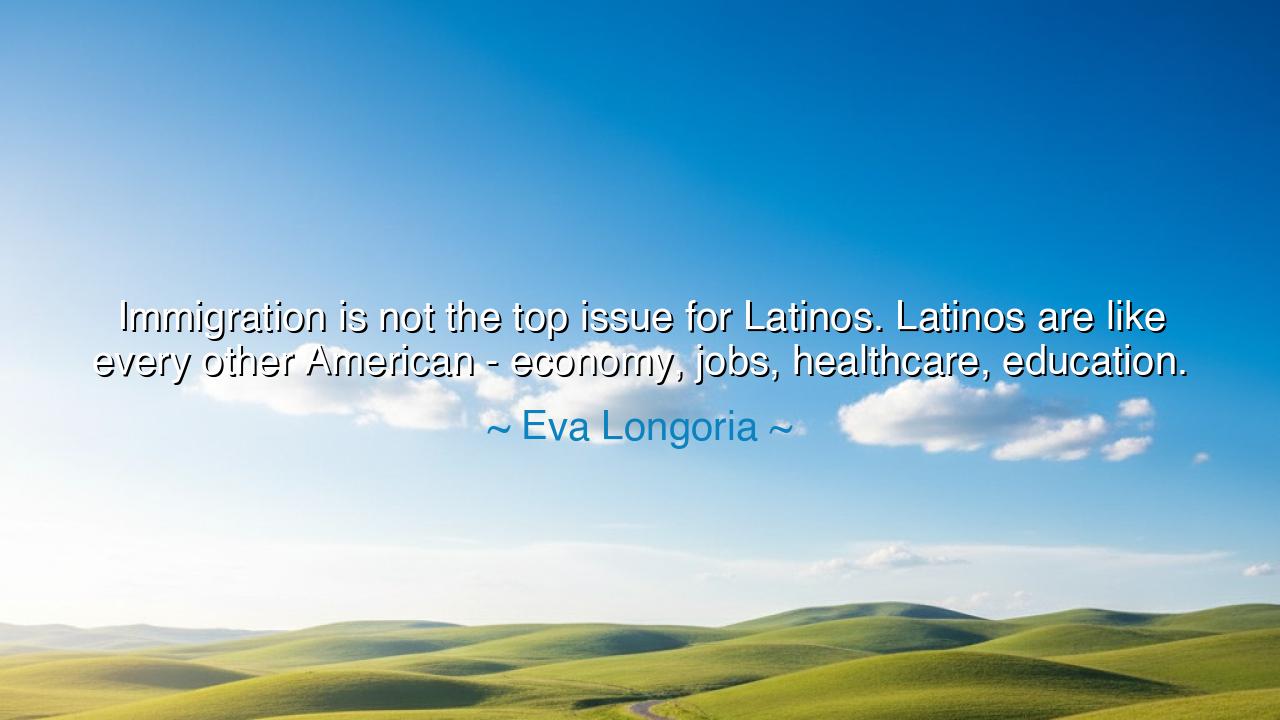
Immigration is not the top issue for Latinos. Latinos are like
Immigration is not the top issue for Latinos. Latinos are like every other American - economy, jobs, healthcare, education.






Eva Longoria, actress and advocate, spoke with the clarity of truth when she declared: “Immigration is not the top issue for Latinos. Latinos are like every other American – economy, jobs, healthcare, education.” In this statement, she tears away the veil of stereotype and reveals the shared heartbeat of humanity. Too often, entire peoples are reduced to a single story, their vast lives and diverse struggles compressed into one narrow image. Longoria’s words remind us that Latinos, like all people, are not defined by a single issue, but by the universal desires of dignity, stability, and opportunity.
The ancients themselves knew that to reduce a people to one identity was to diminish their humanity. The Greeks saw the Persians not only as warriors, but as men with families, farmers, poets, and priests. The Romans, when wise, understood that their empire endured because they recognized the common human needs of the many peoples under their rule: bread, security, and the chance to live with honor. Longoria, in our modern age, echoes this timeless truth—that Latinos are Americans, and their concerns mirror the same struggles that have bound all peoples in every land.
Her words strike against the chains of misunderstanding. For in the public square, debates often paint Latinos as if their identity begins and ends with immigration. But Longoria reminds us that this is a false mirror. Yes, immigration may touch their community, but their daily lives revolve around the same currents as all others: the economy that feeds their households, the jobs that sustain their families, the healthcare that preserves their lives, the education that shapes their children’s futures. To deny this truth is to deny their full humanity, to cast them as shadows instead of citizens.
Consider the story of César Chávez, who rose not merely as an activist for immigrant workers but as a champion of labor, dignity, and fairness for all farm workers. His struggle was not only about borders—it was about wages, safe working conditions, and justice. By fighting for these, Chávez illuminated the same truth Longoria speaks: that Latinos, like every people, are tied to the eternal concerns of survival and prosperity. His movement was a reminder that justice is not the property of one group, but the shared inheritance of all.
The heart of Longoria’s quote is unity. By lifting up jobs, healthcare, education, and economy, she draws a circle wide enough to include all Americans. For what family, regardless of origin, does not worry about feeding its children, healing its sick, educating its young, or securing its livelihood? Her words are a call to abandon the politics of division and to recognize that the struggles of one community are in truth the struggles of all.
The lesson here is both simple and profound: never reduce a people to a single narrative. Respect their wholeness. See in their concerns the reflection of your own. When you hear Latinos, do not think only of immigration; think of their entrepreneurs, their teachers, their soldiers, their nurses, their artists, their fathers and mothers who rise each morning to labor for their children’s future. See them as neighbors, fellow travelers, and fellow builders of the nation.
Practical actions flow from this teaching. Listen more deeply, beyond the surface of media and stereotype. When engaging with any community, ask not what defines them in the eyes of others, but what they value in their own lives. Work to support policies and efforts that address healthcare, education, work, and economic stability, for these are the pillars of every people. And in your personal life, treat others not as symbols of an issue, but as whole human beings with dreams, burdens, and hopes like your own.
Thus, children of the future, remember Eva Longoria’s wisdom: Latinos are like every other American. To see them otherwise is to blind yourself to truth. To see them rightly is to see the unity of humanity, the common struggles that bind us, and the shared destiny that calls us all. Let this vision guide you, for in unity lies strength, and in recognizing the shared needs of all people lies the foundation of justice.






AAdministratorAdministrator
Welcome, honored guests. Please leave a comment, we will respond soon